Russia and Japan recently reached an agreement to build a joint liquefied natural gas plant in Vladivostok, Russia. In an e-mail interview, Michael Bradshaw, professor of human geography at the University of Leicester and vice president for Research and Higher Education at the Royal Geographical Society, discussed Russia-Japan energy cooperation. WPR: What is the status quo of Russia-Japan energy cooperation? Michael Bradshaw: Russia has only recently become a significant supplier of oil and gas to Japan. The Sakhalin-1 and Sakhalin-2 projects have progressively exported oil and liquefied natural gas (LNG) to Japan since 1999, and both have Japanese shareholders. The […]
Asia-Pacific Archive
Free Newsletter

Negotiators from the P5+1 countries and Iran failed to reach a breakthrough in Istanbul last week at thelatest round of talks over Iran’s nuclear program. Nevertheless, it seems that, once again, Iranian President Mahmoud Ahmadinejad wants to keep negotiations alive with his seemingly never-ending bazaar-style haggling. The reason is simple: Ahmadinejad’s administration requires a positive outcome, at least on paper, so that the U.S., its European allies and the United Nations Security Council lift the debilitating economic sanctions targeting the Islamic Republic. So despite last week’s stalemate, the latest of many, Ahmadinejad is dangling the carrot of compromise to lure […]
A trial involving the son of a minor official accused in a hit an run accident in central China has attracted national attention, according to this Al Jazeera report. The trial sparked public outrage and an internet campaign calling for justice when the accused son brushed off the incident, telling authorities that his father was an official in the government.
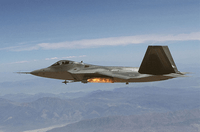
In the background of Chinese President Hu Jintao’s recent visit to the United States was the specter of increased military tensions between China and the U.S. Chinese military capabilities appear to be growing rapidly, with systems like the J-20 stealth fighter and the DF-21 anti-ship ballistic missile threatening key U.S. assets. However, the summit between Hu and President Barack Obama focused more on economic than military issues. And one of the foremost trade problems discussed during the visit was the issue of intellectual property (IP). The United States has consistently criticized China for laxness in IP regulation, complaining that Chinese […]
As a fundamental part of what I consider to be my parental duties, I’ve been broadening my son’s already healthy exposure to kung fu movies over the past few months. And I’m repeatedly struck by how many insights they offer into the formative folklore that animates modern-day China. Like Westerns for America, they are heavy in caricatures and historic inaccuracies. But they also reflect, at times crudely and at others quite elegantly, Chinese culture’s self-image and its view of the “other.” So as much as I found last week’s bilateral summit between Presidents Barack Obama and Hu Jintao dramatically overblown […]
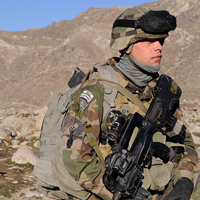
The attacks of Sept. 11 were a significant event: for the attacks in and of themselves; for what they brutally revealed in terms of international terrorism’s new ambitions; for their chain reactions, around the world and, in particular, in the countries that, whether due to solidarity or interest, entered the global war on terrorism alongside the United States. Among those nations, France immediately rallied to America’s side and, as a result, found itself, along with others, quickly dragged into a conflict that it had not sought: the Afghanistan War. Nine years since they arrived in Afghanistan, French troops are still […]
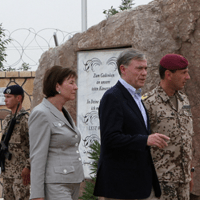
Last June, German President Horst Koehler, after visiting Afghanistan, called Germany’s participation in the war there vital to protecting long-term German interests. Koehler, whose role is primarily ceremonial, with little real political responsibility, told a German radio station that Germany’s export-driven economy and dependency on foreign trade meant that, “. . . in an emergency, military intervention is necessary to defend . . . trade routes, or prevent . . . regional instabilities that would certainly have negative effects on [Germany’s] trade, jobs and income.” He then urged Germans to “look at the reality” of Germany’s presence in Afghanistan and […]
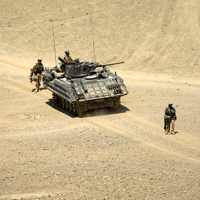
When the Netherlands and other European members of NATO invoked Article 5 of the North Atlantic Treaty after the attacks of Sept. 11, 2001, they almost certainly did not anticipate that, in doing so, they would find their armed forces engaged in a decade-long conflict in Afghanistan. The Article 5 declaration — holding that Sept. 11 was an attack on NATO’s collective security — was intended as a low-cost gesture of trans-Atlantic solidarity with the United States and the traumatized American people, rather than as an operational commitment to wage a protracted and frustrating conflict. But through NATO, European militaries […]
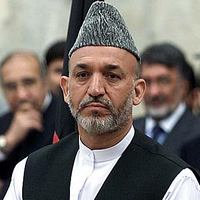
Afghan President Hamid Karzai’s two-day stay in Moscow on Jan. 20-21 marked his first official bilateral visit and the first state visit by an Afghan president to the Russian Federation since its founding after the Soviet Union’s disintegration in December 1991. The trip — during which Karzai met with President Dmitry Medvedev, Prime Minister Vladimir Putin, and other Russian political and economic leaders — provided an important opportunity to both confirm recent growth in formal ties between the two countries as well as impart additional momentum for further expanding the relationship. Karzai was accompanied by most of the Afghan cabinet, […]
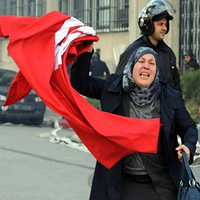
Beginning with the Iranian Revolution in 1979, the West has viewed the Middle East and North Africa primarily through the lens of radical fundamentalist political movements. That perspective has narrowed our strategic vision ever since, conflating Shiite with Sunni, evangelicals with fundamentalists, Persians with Arabs, Islamists with autocrats, and so on. But recent events in Tunisia and Algeria remind us that the vast bulk of history’s revolutions are fueled by economics, not politics. In this, the struggle for Islam’s soul is no different than that of any other civilization in this age of globalization’s rapid expansion. All of the world’s […]
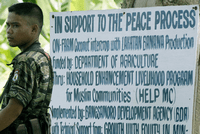
Editor’s note: This is the second of a two-part series on the Philippines peace process. Part I examined talks between the Philippine government and Maoist insurgents. Part II examines negotiations between Manila and the Moro Islamic Liberation Front. While the reopening of peace talks between the government of Philippine President Benigno Aquino and the country’s leading Muslim rebel group, the Moro Islamic Liberation Front (MILF), is a welcome development, doubts remain on whether the Philippines is ready to seal the deal. At a preliminary meeting held in January, the two parties agreed to hold formal exploratory talks on Feb. 9-10 […]
Presidents Barack Obama and Hu Jintao held a joint press conference on Jan. 19, 2011. The first question from the press, on the issue of human rights, comes at 16:45 in the video. Both Hu and Obama commented on a wide variety of issues, including human rights. “China recognizes and also respects the universality of human rights,” said President Hu. “At the same time, we do believe that we also need to take into account the different and national circumstances when it comes to the universal value of human rights.”
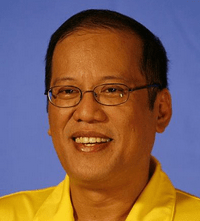
Editor’s note: This is the first of a two-part series on the Philippines peace process. Part I examines talks between the Philippine government and Maoist insurgents. Part II will examine negotiations between Manila and the Moro Islamic Liberation Front. Upholding an electoral promise, Philippine President Benigno Aquino has pushed for the reopening of peace talks with the Maoist rebels of the New People’s Army (NPA) and the Islamic rebels of the Moro Islamic Liberation Front (MILF). The prospects for the two peace tracks are beset with difficulties, although for different reasons, with the NPA talks in particular presenting daunting challenges. […]
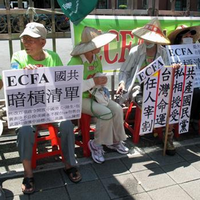
TAIPEI, Taiwan — Six months after the hotly contested signing of a controversial cross-strait trade pact, Taiwan may be beginning to accept talks with China as business as usual. Only a few dozen desultory protesters could be seen waving signs around in the bitter winter air in Taipei during the latest round of cross-strait negotiations last month. Police officers assigned to preserve the peace appeared more relaxed than during past talks, perhaps confident they wouldn’t need to exert themselves pulling apart mobs around Chinese envoy Chen Yunlin’s hotel. Flash back to June 2010, in the sweltering last few weeks leading […]
The Obama administration still says it will begin withdrawing U.S. forces from Afghanistan in six months. But a recent visit to Afghanistan by U.S. Vice President Joe Biden raised questions about how long the U.S. military will actually stay there and some analysts say there are benchmarks that Washington and NATO should consider in determining the length of their mission.
